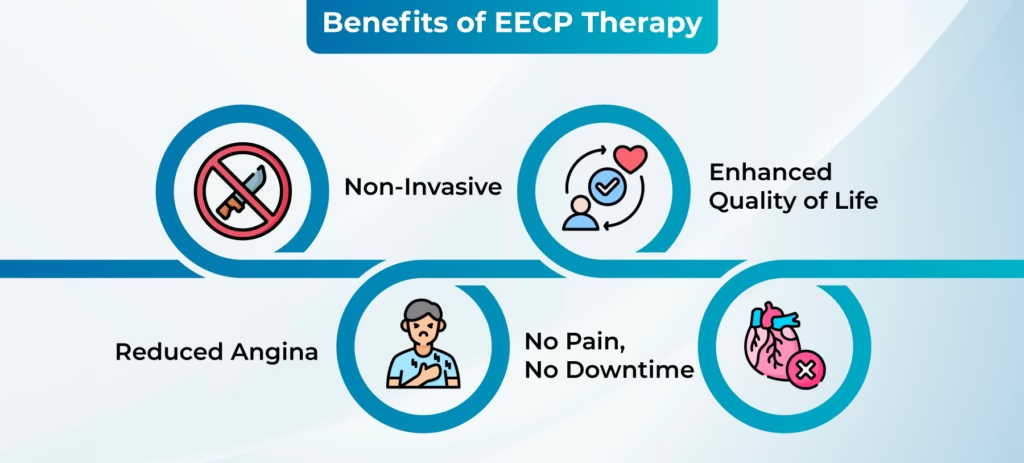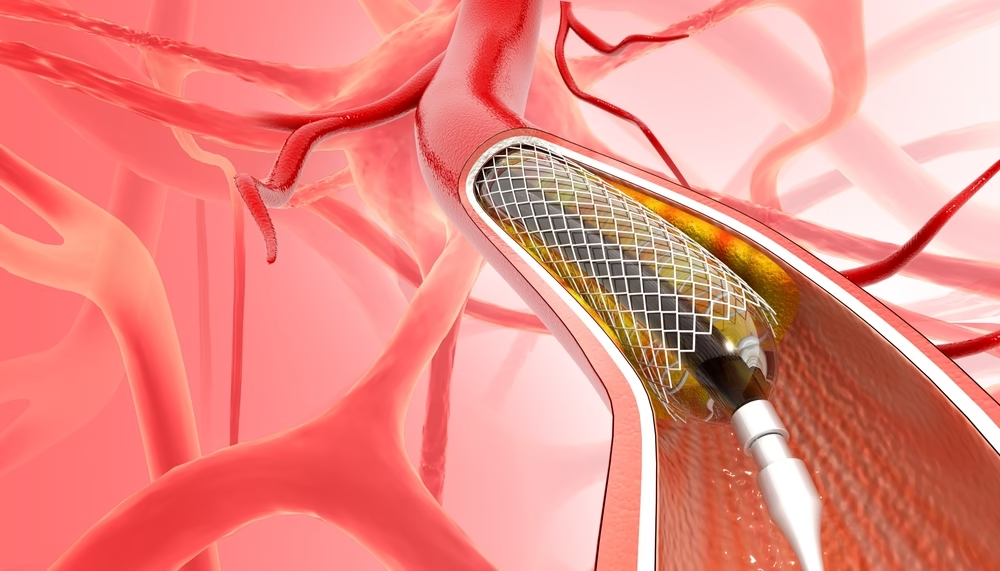It is daunting to sit at your doctor’s office and hear the words, “We need to place a stent.” For many, that moment feels like the only option—a quick remedy to clear blocked arteries. In India, around 5.5 lakh stent procedures are done annually, the recorded average. But did you know that there are non-invasive solutions i.e. stent alternatives that can treat your heart blockages without surgery? In only a few seconds, SAAOL Heartcare Delhi can change your outlook on heart care forever. Stents have long been the main method for heart blockage treatment. They undoubtedly save lives and have rescued countless hearts. However, current research is challenging common wisdom. SAAOL, founded by Dr. Bimal Chhajer, is the pioneer for alternative treatments like EECP in India and these not only provide equivalent benefits but may potentially result in better long-term outcomes. The prominent option, Enhanced External Counterpulsation (EECP) treatment, is a non-invasive therapy that has shown to be a game changer for many heart patients.
This blog delves further into the alternatives to stents and bypass surgery. We’re looking into novel therapies, lifestyle adjustments, and advanced treatments that go beyond traditional mechanical solutions. If you’re a patient dealing with a difficult diagnosis, someone looking for better options, or simply inquisitive about the future of heart care, this handbook is for you. Let’s look at the transforming possibilities that could change your heart’s future.
Are Stents always required?
For decades, stents have been the preferred treatment for coronary artery disease. When arteries constrict owing to plaque formation, a small mesh tube is placed to restore blood flow. It sounds simple and often works. But here’s the catch: according to JAMA Network, up to 30% of individuals with stable coronary artery disease may not benefit from stenting when compared to those who get appropriate medical therapy.
This calls into question the notion that a stent is the best—or only—solution. In many cases, the genuine remedy is a complete, personalized approach that addresses the underlying cause of heart disease rather than just treating the symptoms. It’s about restoring your heart’s natural healing abilities and increasing overall health using modern and advanced, non-invasive treatments.
Enhanced External Counterpulsation (EECP): A Non-invasive Marvel
One of the most promising alternatives to stenting is Enhanced External Counterpulsation or EECP. In much simpler words, it is a non-invasive FDA-approved treatment that improves your heart’s blood flow without any surgical procedure, needles, or metal implants. That is EECP in a nutshell. Several clinical studies have shown that EECP is much more effective than surgical procedures with promising results.
How Does the EECP Work?
This EECP therapy involves relaxing on a treatment table while pneumatic cuffs that are wrapped around your legs inflate and deflate in sync with your heartbeat. This compression assists in moving blood back to the heart, boosting blood flow and artery growth. The collateral arteries that form during this exercise increase the amount of oxygen supplied to the heart muscle, improving symptoms and heart function over time.
What are the benefits of EECP therapy?
Non-Invasive: There will be no surgery or incisions, only a series of treatments that work with your body’s natural processes.
Reduced Angina: Many patients report great relief from chest pain and better exercise tolerance.
Enhanced Quality of Life: With improved circulation and fewer symptoms, everyday activities become less of a struggle.
Proven Results: Studies published in Springer and other credible sources have shown that EECP can be as effective as more invasive procedures in some patient groups.

For individuals who are not candidates for surgery or prefer not to undergo intrusive procedures, EECP provides a viable alternative that works from within. It is a therapy that acknowledges the body’s natural ability to heal while offering a boost when it is most required.
Lifestyle Medicine: Best and Natural way to improve heart health
Within the realm of alternative medicine, lifestyle medicine is a term that cannot be ignored. Everyday decisions affect the overall well-being of an individual and heart health quite directly and go beyond what a single treatment might achieve.
The Role of Diet in Heart Disease Reversal
Getting coronary artery disease carries with it the responsibility of following a stringent diet, and this can put pressure on the arteries during the efforts. A balanced Zero-oil diet that has vegetables, fruits, whole grain cereals, legumes, and millet can be sustained. Studies have linked these diets to a determined reduction of frequencies of cardiovascular occurrence. It is more than avoiding dangerous foods. It is about adopting those that positively change hearts for the better.
Exercise is More Than Just Physical Activity
In addition to burning calories, the moderate and optimum amount of exercise increases the capacity of the heart. 150 minutes weekly is the minimum aim along with aerobic exercise. Improved circulation, lower blood pressure, and better weight control are the achievements of even relatively less rigorous exercise like cycling, light swimming, and brisk walking. Over days to months, consistent exercise can lead to major benefits in heart functions.
Effective Stress Management Tips
Chronic stress is a huge risk factor for developing heart disease. It makes the bladder work overtime, causes inflammation, and even disrupts the heart rhythm. Stress management techniques such as meditation, yoga, or a simple stroll in nature can reduce stress and protect one’s heart. This practice reinforces the link between emotional and physical health.
A Good Sleep is the heartbeat of a healthy heart
Rest is the very backbone of cure and healthy heart maintenance. Inadequate sleep worsens inflammation and increases cardiovascular danger. Your sleep hygiene could improve with better sleep practices, more rigid bedtime rituals, and even seeking help with sleep disorders like sleep apnea.
When a Stent May Still Be Required
To be clear, stents remain an important tool in the management of acute coronary events. In severe, unstable coronary artery disease or after an acute heart attack, restoring blood flow as soon as possible can save lives. However, for patients with stable illness, the choice to place a stent should be carefully considered against other options.
Key aspects to consider are:
Your Overall Health: Younger patients with stable symptoms may benefit more from a complete, non-invasive treatment strategy.
Plaque characteristics: Advanced imaging techniques such as CT Angiography can help determine whether a plaque is stable or at high risk of rupture, which influences treatment options.
Long-term outcomes: Recent trials, like ORBITA, have raised concerns regarding the long-term benefits of stenting in certain populations, implying that medicinal therapy combined with lifestyle adjustments may produce comparable, if not superior, results over time.
Success Stories to Inspire
Let us talk about one of our patients Mr. Dinesh Dagar, who was diagnosed with low heart pumping of just 20%. He was initially advised to get an angiography test. As we all know angiography is a minimally invasive diagnostic test. He couldn’t get any clarity or information support for his heart health, thus, he was not convinced to get the test done. He came to SAAOL Heartcare Delhi and got all the clarity and emotional support on his heart health, not only that, he chose regular EECP sessions, and a personalized fitness and diet regimen. His symptoms gradually subsided, and a follow-up consultation revealed his increased heart pumping of 60% in just 30 days. With his loving and supporting family beside him and SAAOL’s care, he is now healthy and fit.
These stories demonstrate an increasing trend towards holistic, patient-centered care—a future in which you have a role in your treatment plan and alternative therapies can compete with established approaches.
Empowering Yourself: Taking Control of Your Heart Health
Your heart is the center of your life. It is critical that you feel empowered to make educated decisions regarding your healthcare. To navigate your heart health journey, you can take the following steps:
Ask questions
Don’t accept a one-size-fits-all recommendation. Enquire about all treatment choices, including the risks and advantages of stenting vs. alternatives such as EECP, lifestyle changes, and stress management.
Seeking a second opinion
It can lead to new ideas and improved methods for your disease.
Regular monitoring
Regular heart check-ups, blood tests, and imaging examinations are necessary. They not only track the evolution of your heart disease but also measure the effectiveness of your treatment plan.
Lifestyle modifications
Make lifestyle changes such as eating a heart-healthy diet, exercising regularly, managing stress, and practicing good sleep habits. These modifications provide the cornerstone of long-term cardiac health.
Stay informed
Cardiovascular medicine is constantly evolving. Keep up with the newest research and don’t be afraid to explore new treatments with your healthcare team.
The Future is Personalised: A New Era in Heart Care
Personalised medicine is changing the way we tackle cardiac disease. With advancements in genetic testing, sophisticated imaging, and biomarker analysis, clinicians can now personalize therapy to your specific needs. This means that the future of cardiac care will be on identifying the optimum combination of medicines and particularly non-invasive heart treatment for you, rather than a single solution, such as stents.
Final Thoughts: Choose the Path That is Right for You
There is no universal solution to heart disease. The selection between a stent and other therapies is highly individualized and should be made with a thorough awareness of your illness, risks, and long-term objectives.
Your heart is more than simply a pump; it’s a complicated, dynamic organ that reacts to everything from medications to daily activities. Dr. Bimal Chhajer urges all to empower themselves with knowledge, ask tough questions, and consider every option. Whether you pick a stent, EECP therapy, optimal medical therapy, or a mix of treatments, what matters most is that your treatment strategy is tailored to your specific needs.
Remember that your heart deserves the greatest treatment possible. Take control of your health, collaborate with the SAAOL medical team, and commit to a treatment plan that will provide you with a robust, healthy life for many years to come.

